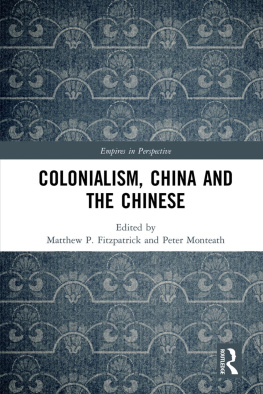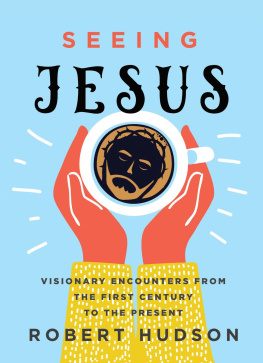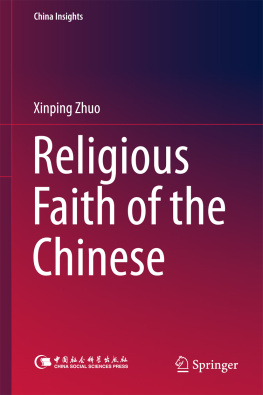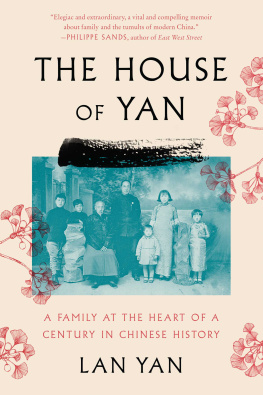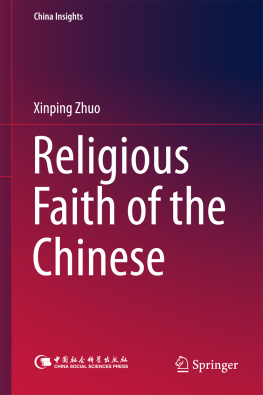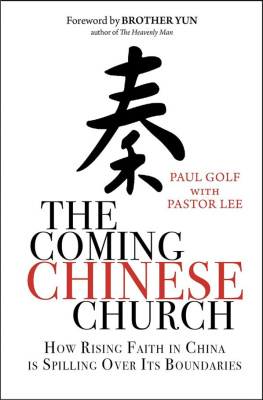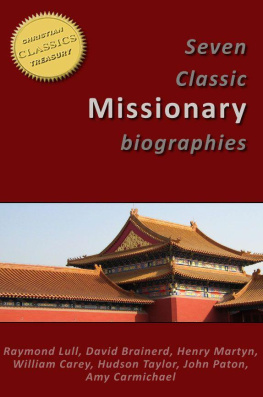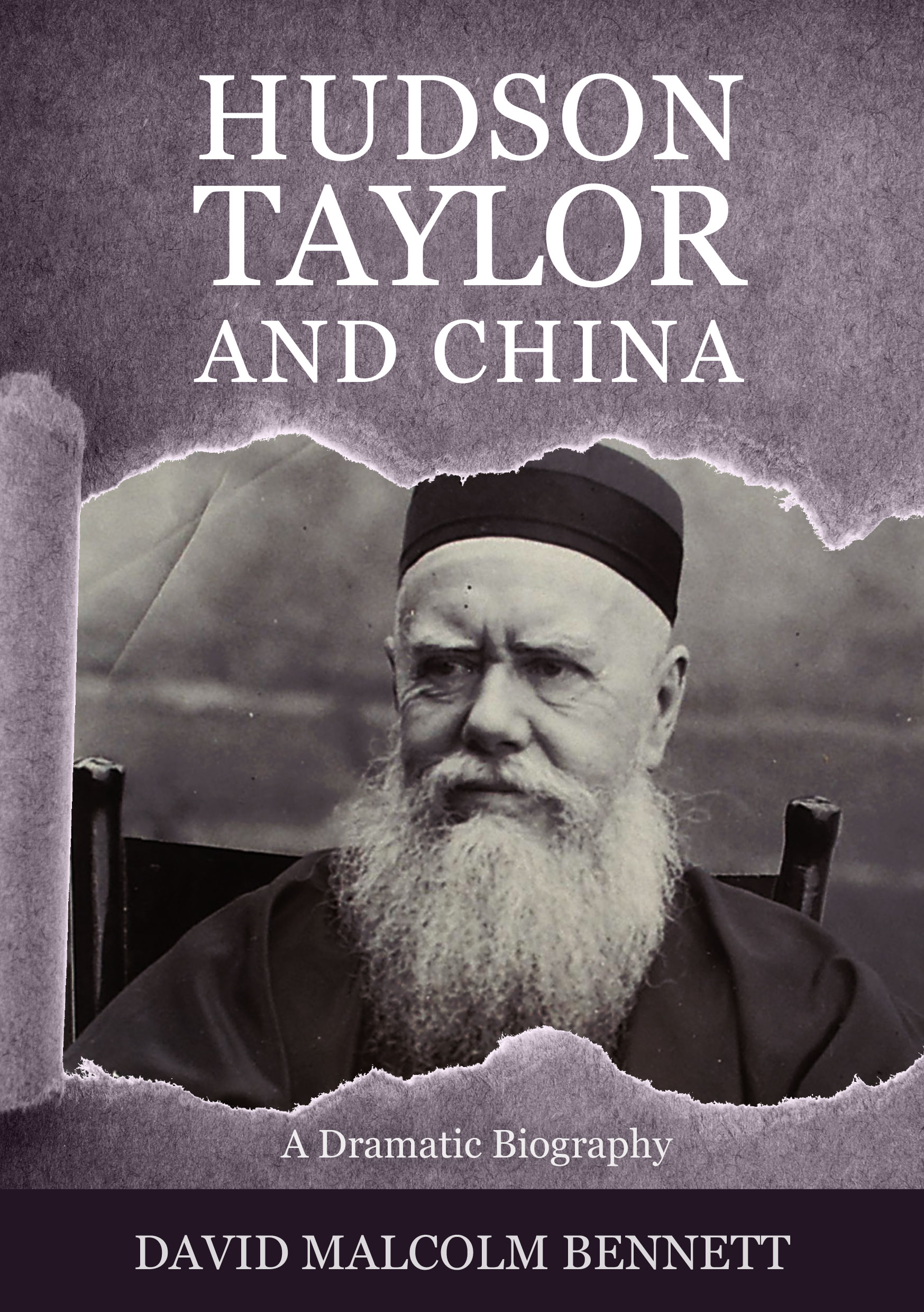Hudson Taylor
And
China
A Dramatic Biography
David Malcolm Bennett
Hudson Taylor and China: A Dramatic Biography
Copyright David Malcolm Bennett 2018
Published by Rhiza Press
www.rhizapress.com.au
PO Box 1519, Capalaba Qld 4157
Ebook Edition:ISBN:978-1-925563-46-7
A cataloguing record for this title is available at the National Libary of Australia.
All rights reserved. No part of this publication may be reproduced, stored in a retrieval system or transmitted in any form by any means without the prior permission of the copyright owner. Enquiries should be made to the publisher.
Hudson Taylor
And
China
A Dramatic Biography
Contents
England and the
China Inland Mission95
NOTES
This is a genuine biography of James Hudson Taylor, though it has been dramatised to give the story more impact. This means that all the incidents recorded here happened, though some details have been imagined. In addition, while some of the conversations in this book are as recorded by the participants, most of them have been imagined, though they are based on the known thoughts and words of the characters.
Please note that when the word Mandarin is spelt with a capital M it refers to the language. When mandarin is spelt with a lower case m it refers to a Chinese magistrate or other official.
The China Inland Mission, founded by Hudson Taylor, served in several Asian lands. However, in this book it has been decided to concentrate primarily on its work in China.
Sometimes the China Inland Mission is referred to in these pages simply as the Mission, with a capital M. However, when missions or mission in general are referred to a lower case m is used. This is intended as a means of identification, not to elevate the CIM over other missions.
There are different systems of spelling for Chinese place names. The postal system has been used in this book.
ABBREVIATIONS
AB: American Baptists
CES: Chinese Evangelisation Society
CIM: China Inland Mission
CMS: Church Missionary Society
LMS: London Missionary Society
OMF: Overseas Missionary Fellowship (the successor to CIM)
ACKNOWLEDGEMENTS
I wish to thank Sheron Ng, Ken Haron, Linda McKerrell and Mark Chapman of OMF International for their encouragement and help. As always I am grateful to my wife, Claire, for her comments on the manuscript, and for tolerating me spending so much time looking back to the nineteenth century.
I also wish to pay tribute to A. J. Broomhall for his remarkable Hudson Taylor & Chinas Open Century (7 vols. London: Hodder & OMF, 1981, 1982, 1984, 1985, 1988, 1989). It is a fine work of scholarship that I found extremely useful in researching the life of Hudson Taylor and mission in China.
David Malcolm Bennett (March 2017)
Chapter 1
Hudson Taylor Arrives in China
A cannon ball screeched overhead and hit too close for comfort, smashing into a building with terrific force.
Then another did its terrible work.
And another!
Then gunshots!
They were followed by the screams of the injured, the dying, and those just terrified of what was taking place around them. China was at war with itself and at war with the Europeans, who were exercising an ever-increasing and unwelcome influence upon the nation and its people. That war had now reached Shanghai. It was not a good time or place to begin a missionary career. But James Hudson Taylor had landed in the middle of it.
It was March 1854 and parts of China were being devastated in the Taiping rebellion. Shanghai was in the hands of a group of rebel Triads known as the Small Sword Society. They had taken control of the city from the Manchus six months before and then, in order to stamp their authority on the city, had stabbed to death the citys senior magistrate. Despite this violence, the people of Shanghai had generally been sympathetic to the Triads and supported them: They were glad to see the Manchus go because their officials in the city had been corrupt and had taxed the people cruelly.
The Triad leaders often dressed in elaborate costumes to make themselves appear more regal and increase their authority amongst the people. This particular group wore red turbans and other brightly-coloured clothing and were often referred to as the Red Turban Triads. Most were also well armed. Some of the Small Sword leaders knew the Bible and quoted from it, but they appear to have been cultic rather than genuinely Christian. They were certainly most violent.
The walled city of Shanghai and its surrounding area had significant British, French and American settlements, which included various missions and trading companies. Amongst these missions were the London Missionary Society (LMS), the Church Missionary Society (CMS) and one run by the American Baptists (AB). The city was on the east coast and was a major trading centre. As such it inevitably attracted many undesirables from Europe, including fortune seekers and the more unruly of the sailors, and their behaviour caused friction between the Chinese and European communities.
The Manchus were now massing in the west and south of the city, with a force over 40,000 strong, and hoping to retake it. The Europeans and the Americans had declared their neutrality, but it is always hard to be neutral when one is in the middle of a war, living in or near a city under siege. The Manchus had attacked the British and American communities on the fringes of the city some months before Hudson Taylor had arrived, and, inevitably, the marines and sailors amongst the yang guizi (foreign devils) fought back. In fact, Hudson later said that the Imperial (Manchu) Army was a much greater source of discomfort and danger to the little European community than the Red Turban Triads.
That was the world into which Hudson Taylor had arrived; a world of uncertainty, suspicion and violence. It was a dangerous place.
***
Hudson Taylor was a fresh-faced young man, of slight build, with wavy red hair and penetrating eyes. At this time, he looked little more than a boy, but he was a man of courage and dedication, proven by his being there at this time.
As he disembarked from the ship that had brought him to China, he felt a great sense of elation. He later wrote, My feelings on stepping ashore I cannot attempt to describe. My heart felt as though it had not room and must burst its bonds, while tears of gratitude fell from my eyes.
The ships captain directed him to the British Consulate, where he went to report his arrival and to ask for further directions. He had with him three letters of introduction. He entered the European-styled building and went to the front desk.
Good morning! My names Hudson Taylor. I have been sent by the Chinese Evangelisation Society to take the Gospel to the Chinese.
And what can I do for you? The young man at reception was formal and polite, but not enthusiastic.
I have just arrived from England. I wonder if you can give me directions. Hudson handed over an addressed envelope. Where can I find Dr Tozer?
The young man took the envelope and looked at it. Hes dead. A few weeks ago!
Hudson was shocked by that news, but he quickly recovered. And Mr Lewis Shuck? Hudson handed over another envelope. Hes a Bible translator, I understand.


